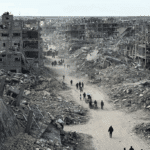Brussels, 15 November 2013 – Who better to respond to this question than Federica, Bahia or Gilles? They are Avocats Sans Frontières’ (ASF) Heads of Mission and Project Coordinator, based in Tunisia, the Democratic Republic of Congo (DRC), and Tanzania. They have gathered for ten days of intensive briefing at ASF’s headquarters in Brussels. Together with their colleagues from the field, they share their views on the core of the organisation’s mandate: the defense of human rights.
“Justice is without borders because no matter where in the world, justice must be accessible,” believe Federica Riccardi, ASF’s Head of Mission in Tunisia, and Katia Urteaga Villanueva, her colleague based in Burundi.

“It’s injustice which is without borders,” adds Hélène Trachez, Head of Mission in the DRC. “Look at the international crimes perpetrated in the East of the country: rape, looting, murder… The fight against these crimes needs to go beyond borders. International justice is, by definition, the collective responsibility of all states, not just of one.”
“The issue of borders also affects lawyers and other human rights defenders (HRDs) who are often confronted with attempts to limit their work, such as threats, judicial harassment or even torture and murder. They need a protection which could require them to leave their country for short periods of time,” asserts Gilles Durdu, ASF Project Coordinator for the protection of HRDs in five central and eastern African countries.
For Bahia Zrikem, ASF’s Representative in Kinshasa, “the boundaries are not only geographical. Justice must also surmount others: political, social, economic, cultural, religious, identity-based… Everyone should have equal access to a fair justice system.” The a.i. Head of Mission in Uganda, Céline Lemmel, affirms that “we all have the same rights, and all of us have the right to have access to justice without being discriminated against. It’s through justice that we safeguard the ability to exercise our fundamental rights.”
“This last point is essential in order for individuals to make choices and live the life they choose to live,” concludes Miriam Chinnappa, Regional Representative in Asia. “One way to ensure that this is achieved is by providing people with access to justice, which strengthens their ability to challenge power structures as well as incidents of discrimination and exclusion. People will then be capable to secure access to assets, such as housing or a plot of land, address poverty, and open up opportunities to advance human development.”
Cover photo: ASF’s Heads of Mission gathered in Brussels for ten days of intensive briefing © ASF



